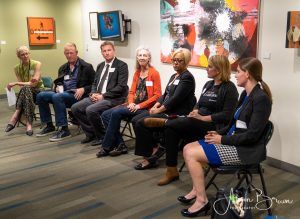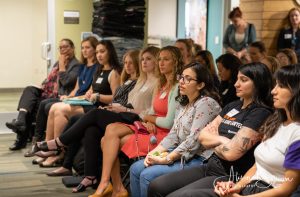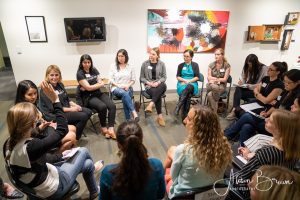Making Moves: Experts Share What It Takes to Land Your Dream Enviro Job
When Women’s Environmental Network launched in a Bay Area living room in 1997, its founders wanted to foster the sense of community they found lacking in their conservation, preservation, engineering, and advocacy jobs—and to pave a path for women behind them seeking environmental careers. Imagine—or recall—if you will: two decades ago, “green” was transforming from just a color into a movement, the term “sustainability” only beginning to emerge, and “global warming” still up for debate. “Clean Tech?” Just a glimmer in Silicon Valley’s eye. But, 22 years later, WEN’s still here to help women navigate environmental careers. And about 80 of you turned out at San Francisco Department of Environment on May 29th for advice, support, and conversation at “Making Moves: An Evening with Enviro Recruiters.”

Paula Swiatkowski (Moderator/WEN Board Member), Bryan Grauss, Preston Treichel, Eileen Ashton, Jalna Amar, Stacy Dellinger, and Hope Zabronsky.
Indeed, WEN has grown along with the number of women in environmental fields, and continues to expand to meet an ever-evolving environmental landscape—one grounded in climate change, social justice, and cross-sector approaches that aim to engage communities, NGOs, governments, and corporations in all-hands-on-deck solutions. And the engaging conversations among the recruiters, HR professionals, and participants at WEN’s May event reflected the vibrancy of all these facets.
Attendees represented a broad range of disciplines, sectors, and career stages—from entry-level to executive. Some had extensive experience in an environmental career, but were looking for their next step—or perhaps a change in function. Others, with freshly minted environmental science or policy degrees, sought advice on how to bag their first green jobs. Still others came from different fields, ready to shift careers to match their values. Indeed, a shared sense of purpose united the women in the room:
“I’m very passionate about the environment and hoping to get a job in the sustainability field.”
“I’m currently a stay at home mom, and looking to get back into the environmental workforce.”
“I work for a software company but want to shift to an environmental field.”
“I come from many years in corporate world. I ‘woke up’ in 2016, then went to a Climate Reality training. Now I’m trying to find the right opportunity.”

Photo credit: Alison Brown
They’d come to the right place! Over the course of nearly three hours, six environmental recruiters and HR professionals representing the public, private, and non-profit sectors shared pro-tips in a panel moderated by WEN Board Member Paula Swiatkowski, earnestly answered burning questions in a series of dynamic small discussion groups, and kept the conversation going during energetic open networking until it was time to go home.
Couldn’t make it? Here are some key takeaways from the sold-out event, shared by the pros!
“Don’t have any errors in your resume!” exclaimed Bryan Grauss, Lead Sales Recruiter at SunRun, who said a surprising number of applicants sort themselves instantly into his “no” pile by submitting applications with typos or grammar and spelling errors. “Some people are more forgiving,” he said. “But I see it as a reflection of the quality of work I can expect.” Grauss also emphasized the importance of understanding that not all interviews are the same. “You’ve got to know how to prepare specifically for the type of interview, whether it’s an in-person one-on-one interview, a panel, or a phone screening.”
As Project Coordinator at Strategic Energy Innovations (SEI), Hope Zabronsky works primarily with early-career candidates, placing them as Climate Corps fellows with host agencies and organizations throughout the region. She acknowledged the chicken-and-egg scenario so many people face: I need experience for this position, but how do I gain experience without experience? Hope emphasized the need to, “Reference the experience you have—from a summer job, an internship, an administrative role—and draw the connection to the experience required by the job you’re applying for. Make a case for yourself,” she recommended.
Anyone who’s ever applied for a government job knows it can seem complicated, opaque, and burdensome (so many steps!). Preston Treichel, HR Consultant at San Francisco Department of the Environment acknowledged that complexity, but said applicants nevertheless must, “Make sure you understand the type of job you’re applying for. Read the description carefully—word for word, and make sure you’re a fit for the position.” Not only that, he said, “It’s critical to research and understand the examination processes and timelines so you’re ready to apply when opportunities arise.”

Photo credit: Alison Brown
Eileen Ashton is a Senior Associate at CEA Consulting, where she leads searches for environmental non-profits and foundations. For her, your resume matters, but it’s the cover letter that really gets her attention. “I want to know why you want this job. How are you aligned with the mission? How does it fit with your story?” Ashton said she loves working with people in career transition, but too often candidates miss the chance to use their cover letters to explain why they’re making a change, and why the change makes sense based on their previous experience. “Tell me your story. Don’t make me try to figure it out,” she said.
Central to your story are your values. And Stacy Dellinger, Recruiting Manager at Earthjustice, really values your values. “In the non-profit sector,” said Dellinger, who recruits for both attorney and non-attorney positions, “it’s critical to show how you connect to our core values—and why those values motivate you to want to work here.”
Jalna Amar, who just joined green building engineering and design firm Integral Group, sees things a bit differently than Ashton and Dellinger. As a recruiter in a more technical setting, she tends to skip the cover letter and dive straight into the resume, where she’s looking for stand-out details. The experienced recruiter encouraged job-seekers to add a “personalized tidbit—like a testimonial—to your resume,” as well as to, “Stick to your guns—be purposeful, stay focused, and get the job you want. Know your worth.”

Photo credit: Alison Brown
Sound advice from some of those who know best! How will you use what you’ve learned to attack your environmental—climate, sustainability, energy, cleantech, justice, science, conservation, law—job search?
